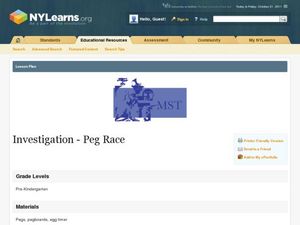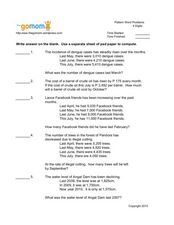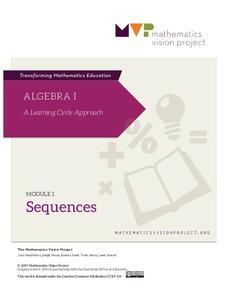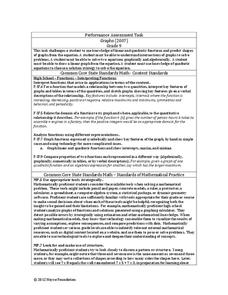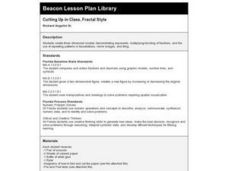Curated OER
Frogs Hopping by 2s
Hop to it! Beginning counters fill in water lily number sequences as a frog "hops" across them, skip counting by twos. There are five sequences in total, and some require counting backward. Learners can reference the two examples, which...
Virginia Department of Education
Rational Functions: Intercepts, Asymptotes, and Discontinuity
Discover different patterns by making connections between a rational function and its graph. An engaging lesson plan asks scholars to explore the behavior of different rational functions. Groups discover a connection between the...
Curated OER
Decreasing and Increasing Fractions
Use this math instructional activity to help your fourth graders further their understanding of ordering fractions. After completing some whole-group activities together as a class, pairs of students play an online game which has them...
Chemistry Collective
Chemical Potential: Staircase Demonstration
It's all uphill from here! Scholars examine the pattern of random particle motion up a staircase. The simulation shows how the linear increase in energy corresponds to an exponential decrease in particle concentration.
Curated OER
How popular is your favorite site?
Students gather data for the project for the entire year. They plot their data, try to fit a equation to their data, and speculate on why the data shows the pattern it does and project its future growth.
Curated OER
Investigation: Peg Race
Students explore competition by participating in a peg race. In this pattern creation lesson, students utilize an egg timer and pegs or colored cubes to create patterns quickly while competing with fellow classmates to finish first....
Curated OER
Pattern Word Problems
In this word problem worksheet, students complete a total of 5 problems that use 4-digit numbers. A reference web site for additional resources is given.
Curated OER
Exploring Infinite Sequences, Part II
For this algebra worksheet, students identify the nth term of the sequence. They find the missing term in the pattern and what theorem justifies their choice. There are 12 questions.
Curated OER
Problem Solving
Fifth graders read and write equations. In this equation writing instructional activity, 5th graders use real life scenarios to write equations. Students use manipulatives, draw pictures and make tables to understand how to write...
Curated OER
Bird airport control
Students identify the various species of birds found in the wetlands. Students observe and record the key skills involved in scientific inquiry. Students handle and interpret data gathered on a field trip which reveals patterns and...
Mathematics Vision Project
Module 1: Sequences
Sequences are all about recognizing patterns. A module of 11 lessons builds pupils' understanding of sequences through pattern analysis. The practice connects the analysis to linear and exponential equations. This is the first module in...
Curated OER
Locomotion, Time And Shapes
Learners practice the concepts of time and rhythm using drum beats. They also create body shapes using verbal cues. The shapes made include stretched, curled, angular, or twisted. The rhythm of beats is increased or decreased to explore...
Chicago Botanic Garden
Climate Change Around the World
It is unknown if cloud cover increases in response to carbon dioxide levels changing, helping climate change slow down, or if cloud cover decreases, allowing Earth to warm faster. Part four in the series of five lessons has classes...
Curated OER
American Minority Groups
Explore the contributions individuals have made in the lives of American minority groups. Twelfth graders write a five-page expository piece providing a social history, examples of discrimination, and patterns of assimilation for an...
02 x 02 Worksheets
Inverse Variation
Discover an inverse variation pattern. A simple lesson plan design allows learners to explore a nonlinear pattern. Scholars analyze a distance, speed, and time relationship through tables and graphs. Eventually, they write an equation to...
Willow Tree
Direct and Inverse Variations
Enhance pupil understanding of proportions and variable relationships by studying direct and inverse variation. Use the idea of a proportional relationship to teach direct variation. Then use a similar pattern to help individuals...
Inside Mathematics
Graphs (2007)
Challenge the class to utilize their knowledge of linear and quadratic functions to determine the intersection of the parent quadratic graph and linear proportional graphs. Using the pattern for the solutions, individuals develop a...
Curated OER
College Calculus
In this college level Calculus worksheet, students examine sequences to determine if they are increasing, decreasing, or non monotonic. Students find the sum of series and determine if they diverge. The one page...
College Board
2009 AP® Human Geography Free-Response Questions
Why have organic farms increased while dairy farms have decreased? Learners unravel this and other questions about geography, religion, and urban living patterns in a set of assessment questions. The resource includes short-answer...
Curated OER
Exploring Optical Movement in Art
Young scholars describe, represent and analyze patterns and relationships using shapes. They create simple geometric patterns. They demonstrate increasing technical ability and skill to complete visual arts assignments.
Curated OER
Whoa! Slow Down-Some of You!
Students analyze demographic data (growth rate, natural increase, fertility rate, crude birth rates, and crude death rates) and determine which areas of the world contain the fastest and slowest growth rates. They construct population...
Curated OER
Watch It Slide!
Students work together to examine inclined planes. They create a plan to raise rocks to build pyramids. They discover the changes that occur when the angle is increased or decreased.
Curated OER
Cutting Up in Class, Fractal Style
Students create three-dimension models demonstrating exponents, multiplying and dividing of fractions, and the use of repeating patterns in tessellations, mirror images, and tiling.
Curated OER
KARYOTYPE ALTERNATIVES
Students comprehend that karyotyping is a process in which chromosomes are cut from an enlarged picture and arranged in decreasing order of size. The cells to be viewed are first chemically treated to increase the number of dividing...





